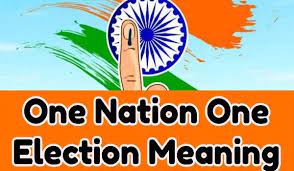
"One Nation, One Election"
What is
"One Nation, One Election"
This topic is related to Current Affairs of IAS/PCS Prelims Exam and Mains Exam General Studies Question Paper 2 Indian Polity.
September 02, 2023
In News:
- Recently the Central Government has constituted a committee regarding One Country, One Election.
- In this regard, the Central Government has made former President Ram Nath Kovind the chairman of this committee.
- This committee will discuss legal and constitutional aspects regarding holding simultaneous elections in the country.
What is One Nation, One Election?
- 'One Country One Election' is a proposal that suggests holding simultaneous elections for the Lok Sabha (lower house of the Indian Parliament) and all state assemblies.
- This means that elections will be held in a single phase across the country. At present, elections are held for the Lok Sabha every five years and state assemblies every 3 to 5 years.
Consent to Government Commissions:
- According to the then Chief Election Commissioner of 2022, the Election Commission is capable of conducting simultaneous elections. However, to implement this idea, the Constitution needs to be changed and this should be decided in the Parliament.
- In December 2022, the Law Commission had also sought views of stakeholders including national political parties, Election Commission of India, bureaucrats, academicians and experts on the proposal to hold simultaneous elections in the country.
Elections have been held together in the past as well:
- Till 1967, simultaneous elections for state assemblies and the Lok Sabha were common in India. After independence, Lok Sabha and Vidhan Sabha elections were held simultaneously in the years 1952, 1957, 1962 and 1967.
- After the year 1967, Lok Sabha and Assemblies were dissolved several times at different times, due to which this order has been broken.
- Some Assemblies were dissolved prematurely in 1968 and 1969 and the Lok Sabha in 1970.
- A decade later, in 1983, the Election Commission proposed holding simultaneous elections.
- However, the Commission said in its annual report that the then government had decided against it. The Law Commission report of 1999 also insisted on holding simultaneous elections.
- The Bharatiya Janata Party, in its election manifesto for the 2014 Lok Sabha elections, said that it would try to develop a way of holding simultaneous elections to ensure stability for state governments.
Its advantage:
- It is argued in support of one nation, one election that it will reduce the expenditure on elections.
- This will increase efficiency in the administrative system across the country.
- In this regard, it is said that during separate voting, the speed of administrative system becomes very slow.
- General administrative duties are affected by elections as officials engage in polling duties.
- It is also said in support of this that it will also help in ensuring continuity in the policies and programs of the Central and State Governments.
- At present, whenever elections are about to be held the Model Code of Conduct is imposed. This places a ban on starting new projects for public welfare during that period.
- One country, one election will save the country's resources. Along with this, the pace of development will also not slow down.
- This will prevent corruption in the country.
What are the challenges?
- According to experts, the dominance of national parties will be more in such elections, and the existence of regional parties may be in danger.
- Lack of awareness among the voters is a major problem, most of the people do not know the difference about the functions and powers of center and state.
- The government may also face some logistical challenges as separate EVM machines will be required for both the elections on the same day.
- It is difficult to reach consensus among all the political parties.
- This would require constitutional amendments to link the tenure of the state legislatures with that of the Lok Sabha.
- In addition, the Representation of the People Act as well as other parliamentary procedures would need to be amended.
- The main fear of regional parties with simultaneous elections is that they will not be able to strongly raise their local issues as national issues take center stage.
- Also they will be unable to compete with national parties in terms of election expenditure and election strategy.
- According to a 2015 study by the IDFC Institute, if Lok Sabha and state elections are held simultaneously, there is a 77 percent chance that voters will choose the same political party or alliance. However, if elections are held at an interval of six months, only 61 percent of voters will choose the same party.
- Holding simultaneous elections in the country will have a negative impact on federalism.
- Prolonged implementation of the model code of conduct by holding simultaneous elections will adversely affect the developmental and welfare programs in the country.
Constitution will have to be Amended:
- According to Union Law Minister Arjun Ram Meghwal, the constitution will have to be amended to hold simultaneous elections across the country.
- According to the Law Commission, at least five constitutional amendments would be needed to hold simultaneous elections.
- For this Article-83, 85, 172, 174 and 356 of the constitution will have to be amended.
o Article 83 is related to the duration of the Houses of the Parliament.
o Article 85 deals with the dissolution of the Lok Sabha by the President.
o Article 172 deals with the duration of the State Legislatures.
o Article 174 deals with the dissolution of state legislatures.
o Article 174 deals with the dissolution of state legislatures.
o Article 356 is related to the imposition of President's rule in the states.
------------------------------
Mains Exam Question
Examine the feasibility of simultaneous elections in the coming years. Write suggestions to deal with the challenges related to simultaneous elections in the country.